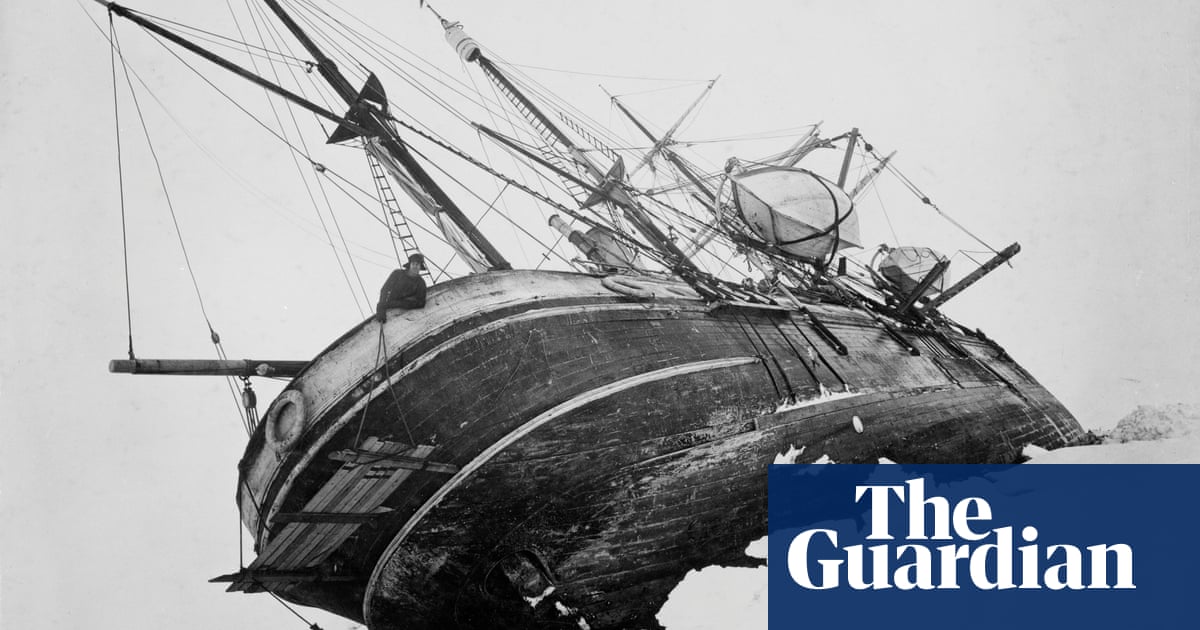A protection ring around the Endurance, one of the most famous shipwrecks of all time, is to be widened from 500 metres to 1,500 metres in order to restrict activities close to the vessel.
The move is part of an international plan to conserve the site, drawn up by the UK Antarctic Heritage Trust (UKAHT) and Historic England, published on Wednesday.
The plan says the Endurance will be preserved in situ, all activity will be undertaken with the aim of preserving and enhancing the site, and nothing will be taken or deposited from the wreck and surrounding area.
The biodiversity, habitats and ecology of the wreck will be recorded and preserved. When the Endurance was found in 2022, it was discovered to be home to sea anemones, sea lilies, starfish and sponges.
The wreck is “pretty well protected” already, 3,000 metres below the surface of the remote Weddell Sea, said Camilla Nichol, the chief executive of the UKAHT. “But now that its location is known, people will be more interested in going, and climate change means the site will become more accessible.”
The Endurance, thought lost for ever, was found in the icy waters of the Antarctic in 2022. It had not been seen since it was crushed by ice and sank in the Weddell Sea in November 1915. Footage showed the 44-metre ship to be intact.
“We are overwhelmed by our good fortune in having located and captured images of Endurance,” Mensun Bound, leader of the Endurance22 expedition, said at the time.
“This is by far the finest wooden shipwreck I have ever seen. It is upright, well proud of the seabed, intact and in a brilliant state of preservation … This is a milestone in polar history.”
In December 1914, Sir Ernest Shackleton set sail from the island of South Georgia with 27 men, heading for Vahsel Bay on the eastern side of the Weddell Sea. The plan was to cross the vast Antarctic ice sheet to the south pole, and then keep going, to the Ross Sea on the other side of the continent.
But two days after leaving South Georgia, the Endurance encountered polar pack ice. In early January, the ship became stuck and eventually the crew decamped to the ice, taking the ship’s stores of food and other provisions, and three open lifeboats. On 21 November 1915, the Endurance finally sank, with Capt Frank Worsley recording its position.
Shackleton and his party continued camping on the ice floes for another five months, before sailing in the lifeboats to Elephant Island. From there, in freezing temperatures and rough seas, Shackleton and five others sailed 800 miles to South Georgia. They organised the rescue of the rest of the crew, who were picked up alive within months.
It was “perhaps the greatest story of exploration, peril, leadership and survival ever told”, the conservation management plan said. “One of the most famous shipwrecks of all time, Endurance is a historic and important artefact and site of pre-eminent international significance.”
It must be “protected and safeguarded for future generations”, the report added.
The plan was shared with the 56 other countries signed up to the Antarctic Treaty, and received “100% endorsement”, said Nichol.
As well as an agreement to extend the area of protection around the wreck, discussions have begun about whether to designate the site an Antarctic specially protected area. “What it will mean is you cannot approach the wreck without a specific permit and a really good reason – so it becomes off limits. It is about future protection.”
Cruise operators and companies that are members of the International Association of Antarctica Tour Operators have agreed not to go within 50 miles of the site, but there was potential risk in the future from fishing trawlers and submarines, said Nichol.
“We want people to engage, but they can do that better by digital means,” she added.
“The story of Endurance is a huge legend that defies belief. It’s a historic human story combined with a contemporary story of the wreck’s discovery that involved money, technology and determination. It is irresistible and universal.”

